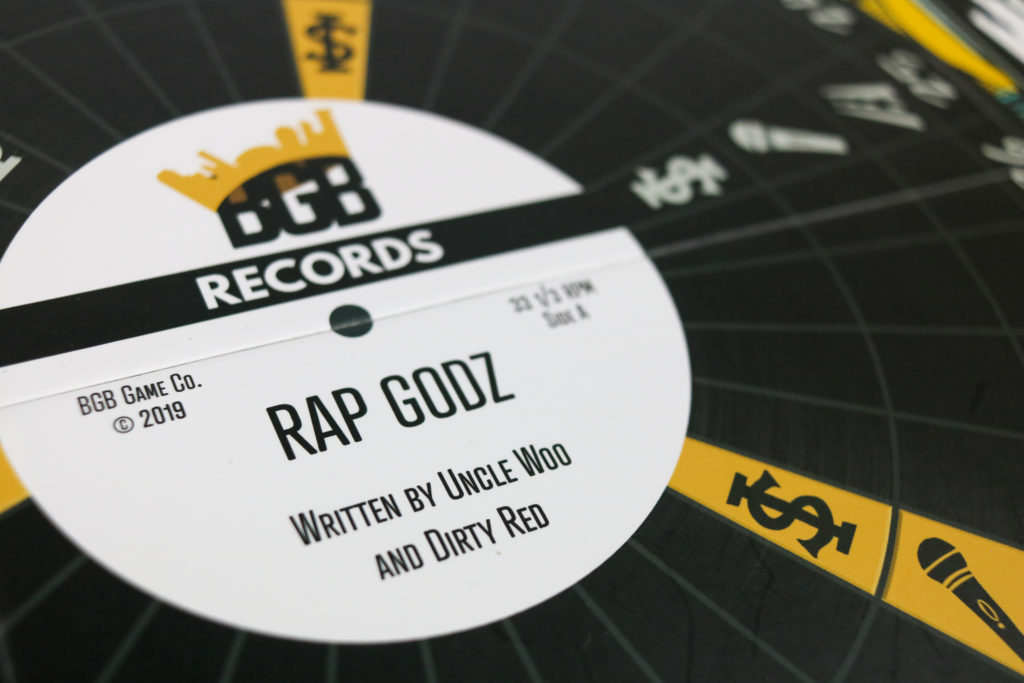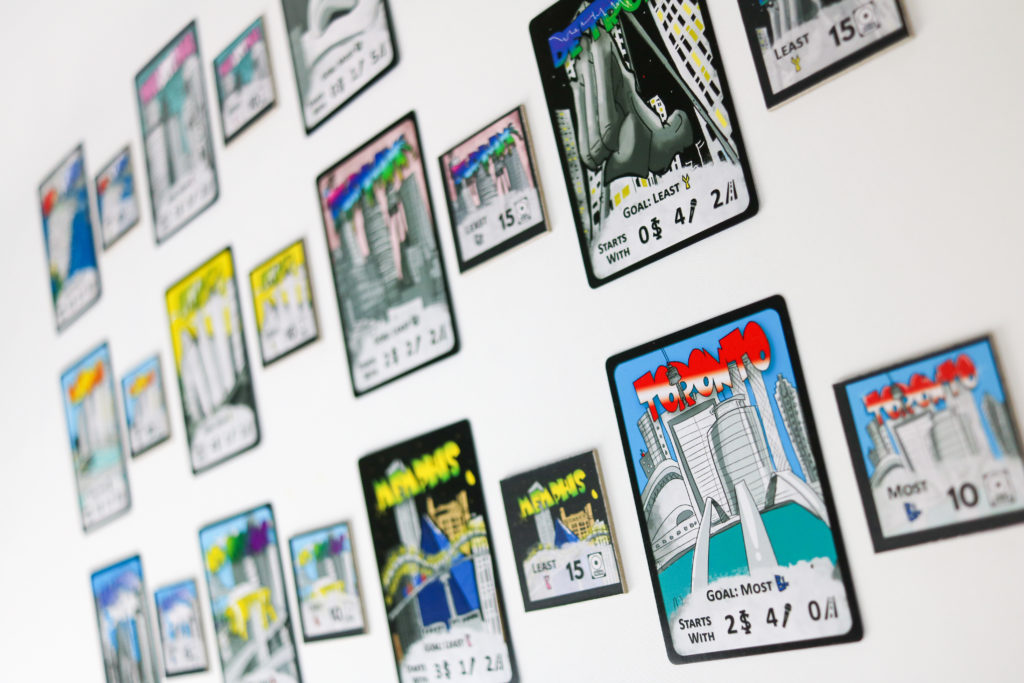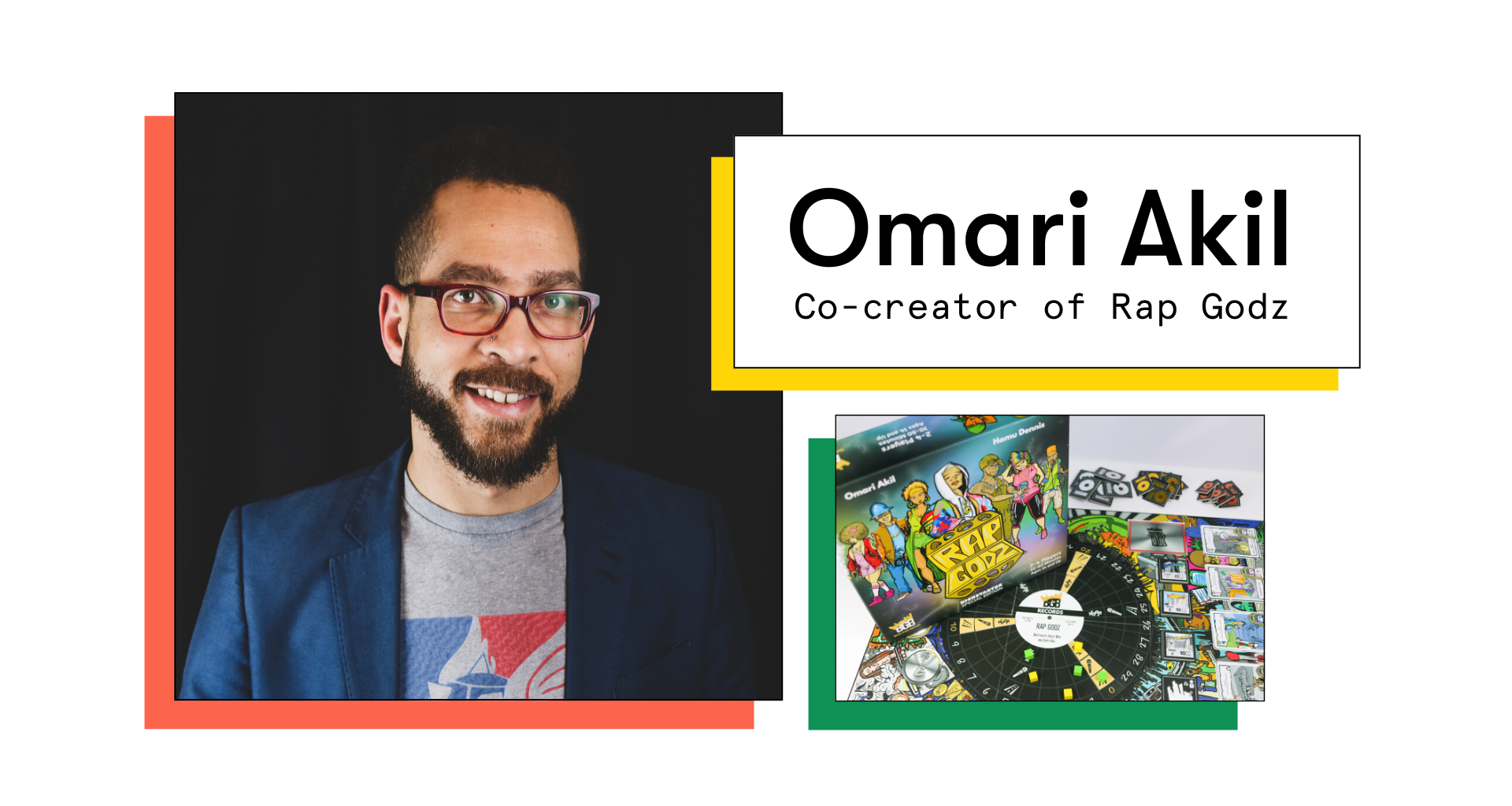In 2018, brothers Omari Akil and Hamu Dennis launched Rap Godz. This unique board game in which you play as a rapper, trying to live your dream as a hip hop artist, was their first Kickstarter campaign. When the pair began what would become a two-and-a-half-year crowdfunding journey, they didn’t know much about running a campaign. But after a lot of research, consulting with more experienced creators, and community-building, they were able to get their project funded, with 390 backers pledging $26,011.
On the heels of that success, they’re doing what a lot of first-time tabletop Kickstarter creators hope to do: building a company. Together they started Board Game Brothas, a brand focused on increasing diversity and representation in the tabletop game industry.
Taking the leap from first-time crowdfunding creator to full-time creator can be daunting. But it can also be exciting if you enter it with the right mindset. We spoke to Akil to learn about his experiences making Rap Godz and the steps you can take to start building your brand.
Define your mission
When you’re a first-time crowdfunding creator, and not sure if you’ll launch another campaign, it’s likely you’re thinking about your mission as it relates to that particular project. Your campaign funding goals, the inspiration behind that specific campaign, and what your product will do for backers are probably your biggest motivators.
But when you’re thinking about turning Kickstarter or Indiegogo crowdfunding into a sustainable business, you have to start thinking deeper about the purpose behind your brand. People get excited about new projects from top creators because there is consistency between projects. Backers know what these creators stand for and what they can expect from them.
Why do you do what you do? What are your values? Who are you as a brand? Answering these questions not only helps you tell your audience what your company is all about, but also can guide and unify all of your future projects.
Shaping a company
Akil and Dennis knew that it was going to take a lot of work to get Board Game Brothas off the ground, and understood that they needed a meaningful goal to keep them motivated. Naturally, they wanted to create great board games, but their mission didn’t stop there. They wanted to inspire other Black creators.
“The primary reason [for starting Board Game Brothas] was that we wanted to make more games that pertain to Black culture. But closely behind that is that we wanted a Black board game publishing company to exist in the hobby space, and potentially grow and become a bigger organization,” Akil says. “It doesn’t have to happen through our company, but we do want it to happen at some point. If you want something to happen, the best way to go about it is to start doing it.”

As Black creators who weren’t seeing many board games that focused on Black culture on Kickstarter, bringing their culture to their projects was essential. Like Akil and Dennis, you should ask yourself what is important to you. How will your company make people’s lives better or contribute to your community? Maybe your mission is socially conscious or maybe it’s about entertainment. Whatever the overarching goal is, it’s crucial that it’s something that drives you to do good work, even when you run into challenges.
You may find it helpful to use a vision pyramid, in which you map out your purpose, why you started your company, and what you believe in. As you redirect your attention from launching individual Kickstarter projects to developing your business strategy, you can look back at the pyramid to make sure every decision you make aligns with your larger goals.
Networking is always important
The community you build before you launch your project can translate into campaign pledges. But community-building can also provide you with the tools, support, and knowledge you need to successfully navigate a Kickstarter or Indiegogo campaign and grow your business. Networking was an important factor in the success of Rap Godz and continues to help Akil in the work that he’s doing with Board Game Brothas today.
Attend events, if you can
Attending an event related to your project category is an excellent way to find someone who can show you the ropes. For Akil and Dennis, networking at conventions with other tabletop Kickstarter creators helped them fill in some of the gaps in their crowdfunding knowledge.
“At the events that are more specifically geared toward playtesting, like Metatopia, or Unpub, or ProtoATL, and other protospiels, people are already having those conversations,” Akil says. “Sure, they’re talking about games and game design, but many of the people there are interested in running crowdfunding campaigns, so it’s just part of the conversation. You don’t have to work as hard to tap into that once you’re in the space.”
Once you’ve made the connection, keep building the relationship. After meeting people at conventions, Akil would reach out to them again later, so he could continue to learn. When he showed his new friends and contacts early versions of Rap Godz, they were excited and curious about the project. Some of these people would later become advocates for the game when Akil and Dennis needed them the most.
The first 48 hours of a crowdfunding campaign are the most important. Getting pledges early can improve your campaign’s momentum, and brings more attention to your project through Kickstarter’s algorithm. Rap Godz, however, was struggling to keep the momentum going as their campaign hit its mid-point. Fifteen days into their 30-day campaign they were 40% short of their goal.
Hitting your goal when you’re only 60% funded at the halfway mark of your campaign is rare. And while Akil can’t pinpoint exactly what turned things around for him, he does feel that the support he received from the tabletop community and other Kickstarter creators played an important role. “People who were prominent in the industry, noticed us in the last weeks, and they helped turn it around for us,” Akil says. “I think that people saw that we were doing something different, and wanted to support that.”
Digital community-building opportunities
Networking doesn’t have to happen in person. And considering that most, if not all, major conventions have been cancelled in 2020 due to the COVID-19 pandemic, online community-building is particularly important. As an alternative to in-person conventions, seek out digital events and tools to make connections and test your product.
Tabletop Kickstarter creators can make digital prototypes and encourage people to play them on platforms like Tabletopia. You can also attend conventions like Gen Con Online or host your own livestream to start building relationships, increasing brand visibility, and growing your audience.
Whether you’re new to crowdfunding or you’re an experienced creator, networking via in-person or digital events can help you build a supportive community. The person you met last year at a convention or online may be someone who can amplify and promote the work you’re doing today. And you can, in turn, do the same for them.
Get social
When preparing for the Rap Godz Kickstarter launch, Akil directed a lot of his attention to social media.
“For board games, social media, Twitter specifically, can be a very powerful tool,” Akil says. “There are a lot of really passionate people who are looking for things that are new and different and interesting, and we were able to tap into that a little bit.”
As a Twitter newbie, it took Akil about a year to learn how to effectively network and promote the game on the platform. He primarily developed his strategy by observing others. “I found people with personalities in games that resonated with me and had followers who engaged in the way that I would hope my followers would,” he says. “I studied them and their activity and tried my best to model my activity off of theirs. But, of course, putting my own personal spin on it that I felt best represented me and my brand.”
As you move from promoting your first project on Kickstarter or Indiegogo to promoting your business, you’ll want to make sure that you consistently engage your audience. There may be years between your crowdfunding projects, but you can keep in touch on social media by posting behind-the-scenes updates, opinions on current events related to your industry, and other attention-grabbing content that’s relevant to the work you’re doing. When in doubt, look at what the top creators in your category are doing.
Reach out to influencers in your niche
A hip hop board game such as Rap Godz isn’t something you encounter every day. This novel idea, which was the brainchild of Dennis, who’d envisioned the game years ago, caught people’s attention. Everything from the hand-drawn art to the storytelling felt new and fresh. Not only did Rap Godz get people from the tabletop community excited but it was also really impressive to artists in the hip hop community.

Akil connected with a few different rappers and let them play Rap Godz. This was one of the most satisfying moments of his crowdfunding experience. “I just got them to come out to a bar and try it out, and they were really excited about it,” Akil says. “And one of them, Defacto Thezpian, was hugely supportive, and said, literally, anything you need me to do to help this project, I’ll do it.” Defacto Thezpian then appeared in the Rap Godz campaign video.
Think of people who are relevant to the product you’re working on. Is there an influencer or local celebrity whose audience intersects with yours? Send them an email or reach out on social media, telling them about what you’re working on. If you have a project that you’re confident and passionate about, you really have nothing to lose and everything to gain by making these types of connections.
Determine what being a full-time creator means to you
Most people would probably say that being a full-time creator means that you make all of your income through your Kickstarter and Indiegogo campaigns. But that isn’t necessarily true.
Akil is full-time in games but the work he’s doing is split between a lot of different projects. He runs Board Game Brothas, and that’s designing, developing, and publishing games. But he also does some writing and content creation — he currently hosts a show on the Tabletop Backer Party Facebook group called The Breakdown. His professional work is all centered around games, but it’s the combination of all of these different projects that supports him.
Akil has learned that you have to be able to do multiple things, especially in the beginning to turn games into a full-time thing. “That can be designing multiple games for multiple publishers, or for yourself, and kind of broadening out by doing a bunch of different games in different areas,” he says. “Or you can do what I’m doing, and just work in different areas in the gaming industry.”
If you want to be a tabletop Kickstarter creator, you can pursue your passion full-time. But it’s important to remember that you have the freedom to decide what that looks like.
Plan ahead — but be flexible
You can’t rest on the success of your earlier projects. You always have to be thinking about what’s next for your brand. For Akil, that means working on multiple projects at once. “Our upcoming project is called Hoop Godz, and it is a street basketball board game. But I’m probably working on about seven games total right now, which is pretty normal,” he says.
As a tabletop Kickstarter creator, having a couple of different projects in the works can help you keep the momentum going for your business and provide you with options if you need to pivot due to unforeseen circumstances. “We actually planned on launching another game before Hoop Godz, but that game took on a whole different life,” Akil says. “It may come out sometime, but it may end up being a totally different game. It may end up being re-themed. Even though the game itself is pretty much finished, it just wasn’t right for us to put that product out here at this time.”
When you start building your brand, you have to think about the bigger picture. “It’s all this balancing decisions about what’s good for my brand right now, what’s good for the industry, what kind of games are out there, and where I fit in,” Akil says. All of these things will come into play as you figure out what’s next for your brand, and they may end up altering your plans, so you have to be open to change.
Akil admits that this move to pursue games has been fairly organic. Board Game Brothas is more about following his interests than making a strategic career move. “I’m here because it seemed like fun and I really enjoy being a part of the community,” he says. “I never really decided to make it a career, I just wanted to spend more time in this world and I guess it’s working out well so far.”
Follow Board Game Brothas on Twitter to get updates on what Akil’s working on. His most recent project, Hoop Godz, was featured in BackerKit’s Black Creators Newsletter — our twice-monthly newsletter highlighting Black-led projects. If you know someone who would be a good fit for the newsletter or would like to submit your own project, please reach out to us at [email protected].
